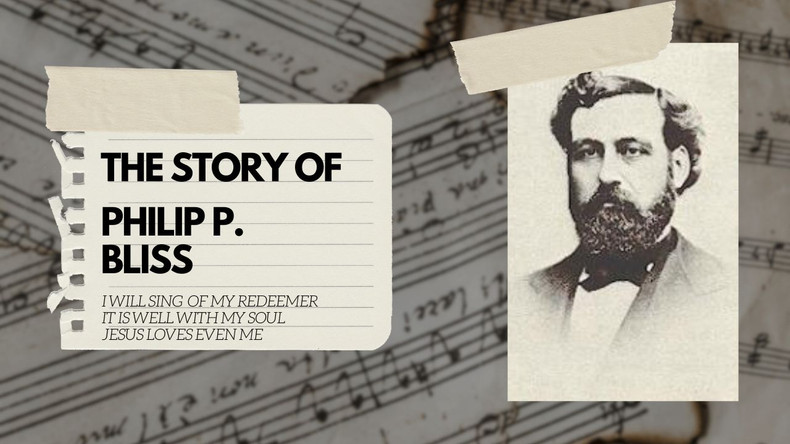It is said that Philip P. Bliss is the second most famous Christian songwriter in history. His songs have been favorites throughout the years, both his music and his lyrics. He wrote the music (but not the lyrics) for one of the most popular hymns, It Is Well with My Soul, and the music and lyrics for Jesus Loves Even Me. For such a prolific hymnwriter, he had quite an unlikely life.
Philip Bliss was born on July 9, 1838. During his childhood, he had very little schooling, but his father and mother made sure to teach him what they could about music and Scripture. He left home at only 11 years old and for the next several years took jobs cooking, logging, and sawing at lumber camps. He would go to school in between his jobs when he was able to. At 18, he became a schoolmaster at Hartville, New York.
A man he met named J. G. Towner believed Bliss had musical potential and sent him to a musical convention, where Bliss would meet another famous hymnwriter, William B. Bradbury. Between the counsel of Bradbury and Towner, Bliss was convinced to become a music teacher. In his teens, he had already been composing his own tunes.
In 1885, Bliss met Lucy Young, whom he would later marry. She was also a poet and came from a musical family. As his musical talents grew (and with Lucy's support and encouragement), Bliss went on to write hymns and work with other well-known Christian songwriters. For example, he was able to compile a songbook with Ira Sankey entitled, Gospel Hymns and Sacred Songs. He began performing his hymns at meetings and in jails to call others to Christ and also to enhance their faith.
When he was only 35 years old, on December 29, 1876, Philip and Lucy Bliss were riding a train in order to be part of a meeting Bliss had been requested to be at. They had recently been with Philip's mother and sister for Christmas, where they left their two young sons. As the train rode over a bridge, the bridge collapsed due to flood damage. The train plummeted and caught on fire after crashing. Bliss managed to escape, but his wife was trapped. Refusing to leave her, he climbed back into the train where he attempted to free her and protect her from the flames. They both died in the accident, along with all but 14 passengers.
Bliss' trunk survived, full of unfinished songs, one of which was I Will Sing of My Redeemer, which has become very popular and a favorite of many. Though he had a short life, he accomplished much. His life and tragic end is a reminder for us to use every moment we have for the Lord and accomplishing as much as we can in the time we are given here on earth for His glory.
Information adapted from:
https://www.wholesomewords.org/biography/biobliss....
Photo taken from:

